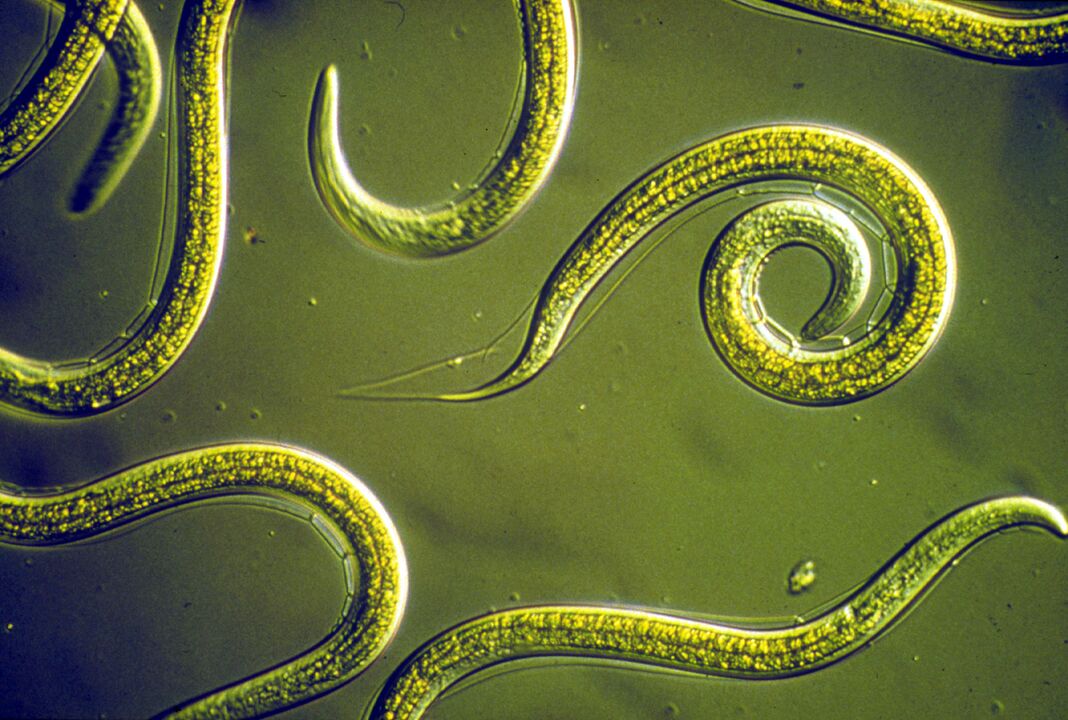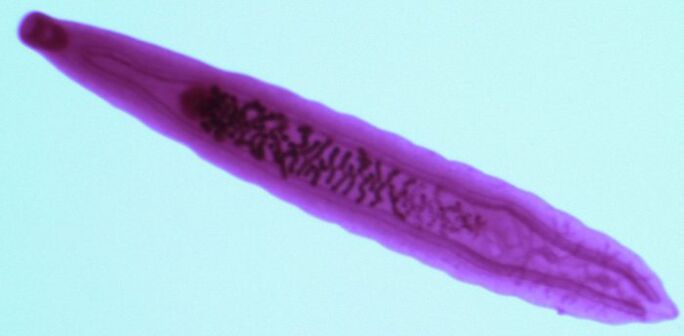Anyone can suffer from a worm attack. Young children - attending kindergarten, adults - for other reasons. Despite all the preventive measures, you should know the signs of worms in humans to spot the disease in a timely manner and start treating it. What are the worms, where they settle and how they manifest themselves - we will consider in more detail.
What organs can be affected by worms?

There are two types of invasion: stomach and tissue. Depending on the species, the habitat is also divided:
- Cavitary worms settle in the small and large intestines. In particular, the first part of the small intestine is affected by tapeworms, tapeworms, tapeworms. The lower part of the small intestine is the habitat of the dwarf tapeworm, the pinworm. The large intestine is most often the habitat of whip worms.
- Tissue helminths affect organs of any kind: liver, brain, lymph nodes, bile ducts.
Important! It is not possible to determine the signs of the presence of worms in patients at an early stage of the development of invasion. Although the number of worms is small, toxic poisoning with waste products is in the normal range, the body itself overcomes the invasion. The appearance of characteristic or acute symptoms indicates a significant increase in the number of helminthic invasions: the maturity of individuals and their dynamic development.
Chain type

To determine the signs of worms in adults, you need to understand the type of aggression we are talking about:
- Vlasoglavy. The chain is named for a filamentous body with a thickening at the back end. The life cycle of the parasite is direct. Habitat - tropical, subtropical. The chain is localized in the secum, so it is difficult to engrave.
- Nematode. Suborder of ringworms that live in nature and the human body. The most famous representatives: ringworms, pinworms.
- Fluke. Flukes are kind of average. They represent a great threat to the body of the carrier, because they can settle in any organ, system. Representatives: schistosomiasis, worm opisthorchiasis.
- Pig tapeworm (tapeworm). Tapeworms are hermaphrodites. Having a strong hook on the head to attach to the wall, it can affect the brain, intestines, liver, eyes, muscles. Untreated consequences: paralysis, death of the carrier.
All types of worms are found in the human body. After becoming ill with ascariasis, enterobiasis, diphyllobothriasis, the patient suffers from a lack of nutrients, the intestines stop absorbing food waste normally. Consequences of aggression: metabolic disorders, neurohumoral reactions.
Some facts about the infection:
- Ascariasis-vegetables, fruits, unwashed hands;
- Raw or lightly salted fish, caviar - diphyllobothriasis;
- Pinworms - home -contact method. The development period is up to 60 days, after which there is a phase of chronic aggression, which is characterized by a decrease in immunity and a high incidence of infectious diseases, exacerbation of chronic processes.
Signs of worms in humans
The general symptoms of worms in adults depend on the location of the helminths. The main danger is posed by parasites that settle in vital organs. Worms appear, symptoms are implied: weakness, cough. And even for a full diagnosis, an examination is required. However, there are a few signs you can determine: where the worm is located and whether it exists at all.
The brain

Often, there are no obvious symptoms, but if the worm lives in the human brain, the patient may experience:
- persistent nausea;
- frequent vomiting;
- severe weakness;
- lethargy of consciousness;
- decreased visual acuity, hearing;
- body temperature fluctuations for no apparent reason;
- epilepsy.
Fact! Often, parasites in the brain are only found after autopsy.
In the body

Hundreds of known species of parasites can settle in a patient’s body. It is difficult to determine the presence of worms in the body of an adult. Symptoms vary according to the area of localization: in the heart, liver, lungs, under the skin. Common signs of worms in adults:
- muscle, joint pain;
- skin deterioration;
- heavy jump: reduced or fixed;
- severe persistent fatigue;
- an immediate decrease in immunity.
Fact! Some worms have the ability to crawl from the anus to the perineum, penetrate the bloodstream to other organs, appear in the abdominal cavity and affect the nose and ears.
In the gut

The most common worms in humans, the more pronounced symptoms, can be in the large and small intestines. Infection occurs through the mouth, through contact. The period of development of larvae and adults from eggs is carried out in the intestinal mucosa. The parasite takes in nutrients for itself, preventing their absorption by the intestines. Because of this, there are intestinal problems that cause helminths in adults. symptoms:
- stomach often swollen;
- broken feces;
- bloated stomach appears;
- weight change;
- always and strongly want to eat.
Of course, with worms, the symptoms may be different, overgrown with characteristic signs of gastric disease, if the patient has any. That is why proper diagnostic steps are so important. Only an expert will determine exactly: where the worm is located, the type and dynamics of the development of invasion.
The signs of helminthiasis depend on the type of parasite
Worm symptoms in adults may be different from those in children. Strong immunity repels aggression, but the child does not have such characteristics. Knowing the signs of the presence of worms in a person, it is easier to understand the cause of the disease and at the first suspicion of infection, see a doctor. Infectious disease specialists, parasitologists, helminthologists - the necessary profile specialists will quickly find out where the worms live in the human body and how to get rid of them.
Each parasite causes its own symptoms:
- from tapeworms there are intestinal problems: loss of appetite, sleep disturbances, bloating;
- from round - cough, bloating, gas formation, loss of appetite.
Important! Ringworms or ringworms grow up to 40 cm in length and can move easily along the intestinal wall, living in the lungs and liver. This is a very dangerous aggression that must be disposed of.
It does not matter whether tapeworms or ringworms have settled in the human body, they need to be removed. Even in minimal amounts, invasion can cause severe harm to the body, and in large masses, parasites poison the host and often cause the death of the patient. Knowing where the worms live, do not rush to eliminate frequent bloating for normal indigestion, maybe this is a sign of helminthiasis, which means it's time to see a doctor.






































